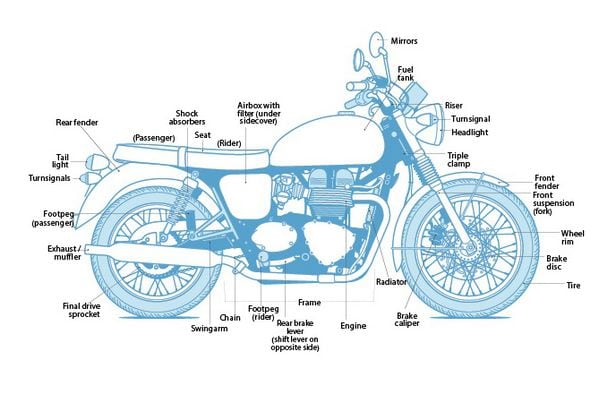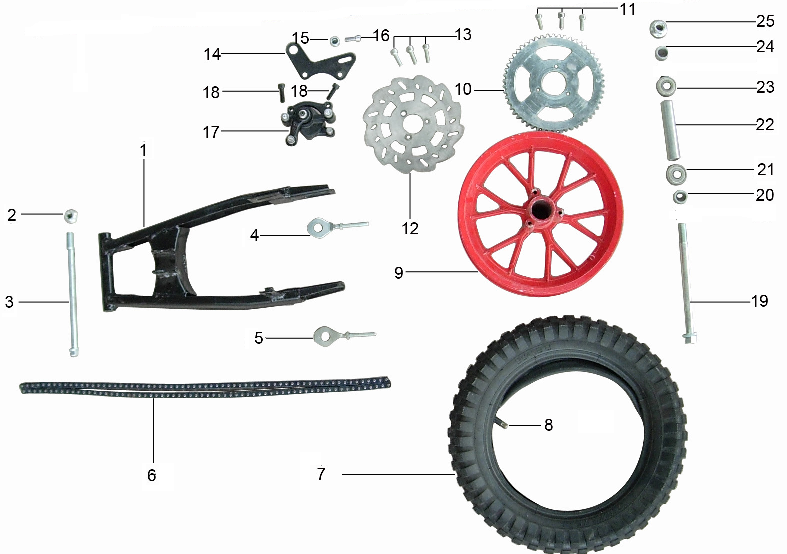Customization Tips Using Aftermarket-Compatible Motorbike Components NZ
Customization Tips Using Aftermarket-Compatible Motorbike Components NZ
Blog Article
Discover the Vital MotorBike Parts You Need for Optimum Performance
Recognizing the vital parts of a motorcycle is fundamental for achieving peak efficiency. Each part, from the engine to the stopping system, plays an important role in general capability and safety. Routine upkeep can prevent unexpected failures and improve the riding experience. Nonetheless, numerous motorcyclists ignore the details of these systems. Discovering exactly how they interact can bring about a more effective experience. What crucial elements should every cyclist focus on?
The Engine: The Heart of Your Bike
The engine functions as the core part of a bike, driving its efficiency and defining its capacities. It is accountable for transforming fuel into mechanical energy, which powers the bike forward. Different kinds of engines are utilized, including single-cylinder, V-twin, and inline setups, each offering unique attributes matched for different riding functions and styles. The engine size, generally measured in cubic centimeters (cc), significantly influences performance, with larger engines normally giving more power and torque.Furthermore, the engine's design and innovation, such as fuel shot systems or air-cooling versus liquid-cooling, affect performance and integrity. Maintenance is necessary for peak procedure; elements like regular oil adjustments and monitoring ignition system warranty long life. Bikers frequently think about an engine's responsiveness and smoothness, as these features improve the total riding experience. Eventually, the engine stays a crucial component that specifies not only the bike's efficiency however also the cyclist's connection to the machine.
The Transmission: Moving Gears Smoothly
The transmission plays a crucial duty in a motorcycle's performance, especially in the auto mechanics of equipment moving. Understanding just how to change gears efficiently can improve the total riding experience, while regular upkeep warranties peak performance. Proper interest to these facets can substantially affect the long life and effectiveness of the bike.

Gear Shifting Mechanics
Smooth gear moving is necessary for optimal motorcycle efficiency, greatly influencing both acceleration and control. The mechanics of equipment shifting include the communication in between the clutch, gear bar, and transmission system. When a cyclist involves the clutch, it disengages the engine from the transmission, permitting a gear adjustment without damaging the components. A well-timed release of the clutch, incorporated with specific motion of the equipment bar, helps with a seamless change between equipments. This procedure guarantees that the engine operates within its finest power band, enhancing efficiency. Motorcycle Spares Christchurch. Additionally, comprehending the equipment proportions and their result on speed and torque can help cyclists make educated selections during shifts, ultimately adding to an extra responsive and pleasurable riding experience
Upkeep Tips Value
Regular upkeep plays an essential duty in assuring that the transmission system operates successfully, enabling smooth equipment changes. Routinely inspecting and altering the transmission fluid is important, as old liquid can result in raised friction and wear. Furthermore, examining the clutch for wear assurances peak engagement and disengagement, avoiding slippage during gear changes. Lubrication of relocating parts is similarly essential to decrease rubbing and boost efficiency. Motorcycle proprietors need to additionally keep an eye on for leaks and uncommon sounds, as these can indicate underlying concerns. By sticking to these maintenance tips, bikers can extend the life expectancy of their transmission system, assuring that gear shifts remain smooth and adding to the total efficiency of their motorcycle.
The Braking System: Ensuring Security on Every Ride
Braking systems are essential components that straight affect a motorbike's safety and security and efficiency. They contain various components, including brake pads, blades, calipers, and hydraulic lines, all interacting to guarantee reliable slowdown. The kind of stopping system-- normally either disc or drum-- impacts responsiveness and stopping power.Regular upkeep is necessary to copyright peak efficiency; worn brake pads can cause lowered performance and enhanced quiting ranges. Furthermore, the quality of brake fluid need to be kept an eye on, as it can absorb wetness over time, jeopardizing stopping efficiency.Riders must additionally consider the significance of anti-lock braking systems (ABDOMINAL), which protect against wheel lockup during sudden stops, improving total security. Correctly operating brakes are not practically stopping; they infuse confidence in the biker, enabling much safer navigation through different surfaces. Eventually, a reliable braking system is vital for taking pleasure in every adventure with comfort.
The Suspension: Enhancing Comfort and Control
A well-functioning shock absorber greatly adds to a motorbike's general performance, complementing the efficiency of the braking system. The suspension plays a considerable role in taking in shocks from uneven surfaces, guaranteeing a smoother experience while preserving tire contact with the road. This get in touch with is necessary for both security and control, allowing motorcyclists to navigate edges with self-confidence and precision.Different types of suspension systems, such as telescopic forks or mono-shocks, provide varying degrees of comfort and handling. Appropriately tuned suspension enhances responsiveness, providing the rider with a more linked feeling to the motorbike. Routine upkeep checks are necessary to identify the suspension components, consisting of dampers and springs, are functioning at their ideal. A reliable suspension system not just elevates the straight from the source riding experience yet also adds to the longevity of other motorbike parts by reducing damage. As an outcome, investing in quality suspension is essential for any type of serious motorcycle lover.
The Tires: Attaching You to the Roadway
Tires play a necessary function in a motorcycle's performance, working as the main link between the roadway and the biker. Recognizing the different kinds of tires available can substantially affect handling and safety and security. Additionally, routine upkeep is crucial to guarantee peak tire performance and durability.
Tire Keys In Explained
Exactly how do various tire kinds affect a motorcycle's efficiency? Tire kinds play an essential function in establishing a motorbike's hold, handling, and stability. Sporting activity tires, created for high performance, offer enhanced grip and responsiveness on paved roadways, making them optimal for racing and hostile riding. Alternatively, visiting tires focus on sturdiness and convenience, providing a smoother ride for long-distance travel. Off-road tires, defined by their tough step patterns, succeed in traction on unpaved surface areas, appropriate for adventure lovers. In addition, dual-sport tires mix attributes from both on-road and off-road categories, satisfying versatile riding needs. Ultimately, choosing the ideal tire kind is necessary for maximizing performance, ensuring safety, and enhancing the total riding experience.
Maintenance Tips Offered
While riding when traveling, keeping optimal tire condition is vital for safety and security and efficiency. Frequently checking tire pressure is very important, as under-inflated tires can result in poor handling and increased wear. It is advisable to examine tread depth frequently; used tires concession grasp and security. Additionally, motorcyclists must search for signs of damage, such as bulges or splits, which can show the requirement for replacement. Revolving tires regularly ensures even use, enhancing longevity. Maintaining tires clean from particles and avoiding excessive visuals can extend their lifespan. Keeping proper positioning and equilibrium contributes to peak performance, minimizing stress on other bike parts. Sticking to these upkeep suggestions will significantly boost the overall riding experience.
The Gas System: Sustaining Efficiency and Efficiency
The fuel system plays a vital role in taking full advantage of a motorbike's performance and effectiveness, as it ensures the optimal shipment of fuel to the engine. It makes up a number of critical elements, including the fuel tank, gas pump, gas filter, and gas injectors or carburetor. Each part must operate efficiently to ensure a powerful and smooth ride.The fuel tank stores gas and provides it to the engine using the gas pump, which generates the essential pressure. A gas filter avoids contaminants from getting in the engine, while the injectors or carburetor mix gas with air for combustion.Proper upkeep of the gas system is essential; a stopped up filter or malfunctioning injector can result in lowered performance and increased fuel usage. By validating that the fuel system runs successfully, motorcyclists can enjoy improved throttle feedback, much better gas economic climate, and in general enhanced riding experience.
The Electric System: Powering Your Ride
A reliable electric system is vital for the total capability and safety and security of a motorcycle, as it powers essential components such as the ignition, lights, and different electronic systems. This system consists of the battery, which shops power, and the generator, accountable for producing power while the engine runs. The wiring my website harness attaches these parts, ensuring dependable power distribution.Additionally, fuses shield the system from overloads, while relays assist manage high-current devices with low-power signals. A properly maintained electric system boosts efficiency by guaranteeing smooth beginnings and consistent operation of signals and lights, crucial for biker visibility and safety.Regular checks of the battery's fee and links are essential for avoiding electric failures. Bikers should likewise inspect wiring for damage, making sure all parts work preferably. Ultimately, a durable electrical system contributes significantly to the total performance and dependability of the motorcycle.
Frequently Asked Concerns
Just how Commonly Should I Replace My Motorbike's Battery?
The regularity of motorcycle battery substitute depends on usage and upkeep (Motorcycle Parts Auckland). Typically, batteries should be changed every 3 to 5 years. Normal checks can help determine when a substitute is required for peak efficiency
What Devices Do I Required for Standard Motorcycle Maintenance?
For fundamental motorbike maintenance, one needs essential tools such as an outlet collection, wrenches, screwdrivers, pliers, tire stress scale, and a torque wrench. These tools assist in efficient maintenance and ensure the motorcycle runs effectively and securely.
Exactly How Can I Boost My Bike's The rules of aerodynamics?
To boost bike aerodynamics, one about his must take into consideration readjusting fairings, using windshield extensions, enhancing body placement, and lowering overall weight. These modifications help lessen drag, enhancing security and gas performance during adventures.
What Are the Indicators of a Failing Electric System?
Indications of a failing electrical system include dimming lights, trouble starting, irregular tool analyses, and blown fuses. Motorbike Components NZ. Unusual smells or deterioration around battery terminals may likewise suggest underlying issues requiring instant focus for security and performance

How Do I Select the Right Oil for My Bike?
When picking oil for a motorbike, one ought to consider the supplier's specifications, thickness ratings, and the type of riding. Additionally, conventional versus artificial oil can influence efficiency and engine defense, influencing the decision greatly. The engine dimension, commonly measured in cubic centimeters (cc), substantially affects performance, with larger engines typically providing more power and torque.Furthermore, the engine's design and modern technology, such as gas injection systems or air-cooling versus liquid-cooling, affect efficiency and integrity. A well-functioning suspension system considerably contributes to a motorcycle's general performance, enhancing the effectiveness of the stopping system. The gas system plays an essential duty in maximizing a motorbike's performance and efficiency, as it assures the optimum delivery of gas to the engine. A gas filter stops pollutants from going into the engine, while the injectors or carburetor mix gas with air for combustion.Proper maintenance of the gas system is important; a clogged up filter or malfunctioning injector can lead to reduced efficiency and raised gas consumption. A properly maintained electrical system boosts efficiency by ensuring smooth begins and regular procedure of signals and lights, vital for biker exposure and safety.Regular checks of the battery's charge and connections are important for protecting against electrical failings.
Report this page